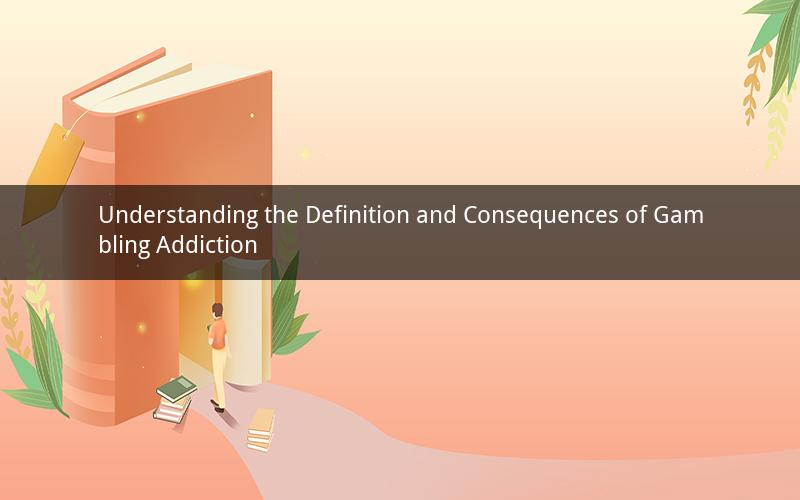
Gambling addiction, also known as problem gambling or compulsive gambling, is a complex issue that affects millions of individuals worldwide. It is characterized by an inability to control or stop gambling, despite negative consequences in various aspects of life. This article delves into the definition of gambling addiction, its symptoms, and the consequences it can have on individuals and society.
Definition of Gambling Addiction
Gambling addiction is defined as a psychological disorder characterized by an uncontrollable urge to gamble, despite negative consequences. It is a form of impulse control disorder, where individuals are unable to resist the urge to engage in gambling activities. This addiction can manifest in various forms, including online gambling, betting on sports, playing slot machines, and participating in lottery games.
Symptoms of Gambling Addiction
Identifying gambling addiction can be challenging, as it may not be immediately apparent. However, there are several symptoms that can help in recognizing the presence of this addiction:
1. Preoccupation with gambling: Individuals with gambling addiction often think about gambling constantly, even when they are not engaging in the activity.
2. Loss of control: Despite attempts to stop gambling, individuals with addiction may find it difficult to control their urge to gamble.
3. Increased tolerance: Over time, individuals with gambling addiction may require more money and time to satisfy their urge to gamble.
4. Chasing losses: After losing money, individuals with addiction may try to win back their losses by continuing to gamble.
5. Lying to family and friends: Individuals with gambling addiction may lie about their gambling activities to hide their addiction from loved ones.
6. Neglecting responsibilities: Gambling addiction can lead to neglecting personal, professional, and family responsibilities.
7. Emotional and physical health issues: Long-term gambling addiction can result in emotional and physical health problems, such as anxiety, depression, and substance abuse.
Consequences of Gambling Addiction
Gambling addiction can have severe consequences on individuals and society. The following are some of the most significant consequences:
1. Financial problems: Gambling addiction can lead to significant financial losses, resulting in debt, bankruptcy, and foreclosure.
2. Relationship issues: The addiction can strain relationships with family and friends, leading to conflicts, separation, and divorce.
3. Mental health problems: Individuals with gambling addiction are at a higher risk of developing mental health issues, such as anxiety, depression, and substance abuse.
4. Legal problems: Gambling addiction can lead to illegal activities, such as theft, fraud, and embezzlement, to support the habit.
5. Health problems: The stress and anxiety associated with gambling addiction can lead to physical health issues, such as heart disease, stroke, and high blood pressure.
Questions and Answers
1. What is the difference between gambling addiction and recreational gambling?
Answer: The main difference lies in the control over the gambling behavior. Recreational gamblers can enjoy gambling without it negatively impacting their lives, while individuals with gambling addiction cannot control their urge to gamble, leading to negative consequences.
2. Can gambling addiction be treated?
Answer: Yes, gambling addiction can be treated, just like any other addiction. Treatment may include therapy, support groups, and medication to help individuals manage their addiction and learn healthier coping mechanisms.
3. How can I help a loved one with gambling addiction?
Answer: The first step is to educate yourself about gambling addiction and its consequences. Then, offer your support and encourage your loved one to seek professional help. It is essential to be patient and understanding, as recovery can be a long and challenging process.
4. Is online gambling more addictive than traditional gambling?
Answer: Online gambling can be more addictive than traditional gambling due to its convenience, accessibility, and the ability to gamble 24/7. The anonymity of online gambling also makes it easier for individuals to hide their addiction from others.
5. Can gambling addiction be prevented?
Answer: While gambling addiction cannot be entirely prevented, individuals can take steps to reduce their risk, such as setting a budget for gambling, avoiding high-risk gambling activities, and seeking help if they notice signs of addiction.
In conclusion, gambling addiction is a serious issue that can have devastating consequences on individuals and society. Understanding the definition, symptoms, and consequences of this addiction is crucial in identifying and addressing the problem. By seeking help and taking proactive measures, individuals with gambling addiction can overcome their struggles and lead healthier, more fulfilling lives.